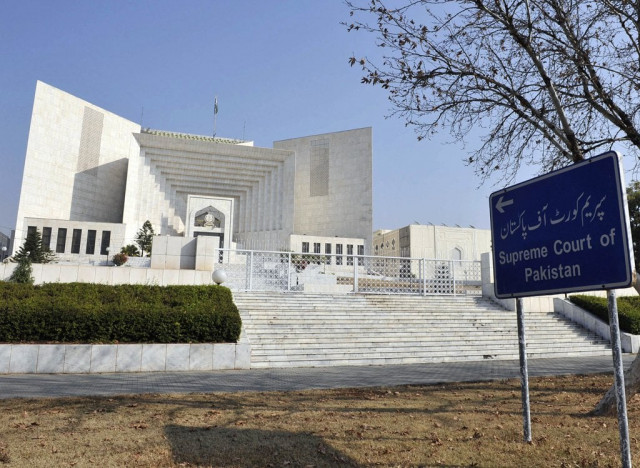Politicians move Supreme Court against K-P ordinance
Petition states law-making bodies have an obligation to make citizens aware of all laws that have been promulgated

The Supreme Court of Pakistan. PHOTO: AFP
“By impugned ordinance all persons in an entire province of Pakistan are subject to a parallel and draconian legal system which authorises detention/internment without charge for an undefined duration. The law under challenge also authorises use of force and other coercive action by armed forces within province. Individuals who are held in internment centers established under the impugned ordinance are being denied their liberty pursuant to the impugned ordinance and have no judicial remedy,” says constitution petition filed by seasoned politicians Farhatullah Babar, Afrasiab Khattak, Bushra Gohar and Rubina Saigol.
Following 25th amendment, two laws were passed in the province of KP last year. Later, both were challenged in the Peshawar High Court. In a surprising development during the litigation, the law officers of KP disclosed that ordinance had been promulgated on August 5.
The petition stated that in a society governed by rule of law, law-making bodies have an obligation to make citizens aware of all laws that have been promulgated. There should be no secrecy on it.
It is also questioned whether a direction to act in aid of civil power is lawful or warranted particularly when such action may impact fundamental rights.
The petition contends that the directions of the federal government are unlawful since they grant armed forces special powers which are not enjoyed by civilian law enforcement agencies through ordinance.
The directions under Article 245 in this case are also unlawful since they effectively impose an emergency in KP without consent of legislature. Article 245 cannot be used to bypass the protections provided Part X of the constitution.
It is also stated that the federal government cannot effectively impose an emergency on a province and suspend fundamental rights through a direction under Article 245 (1).
The consequence of a direction under Article 245 (1) is removed pursuant to Article 245 (3) over the area in which the armed forces have been called to act in aid of civil power.
The petition contends that the ordinance breaches international legal commitments. It is also stated that recitals of the ordinance indicate that for more than 10 years there had been a grave threat to Pakistan’s territorial integrity justifying draconian and extraordinary measures.
Although impugned ordinance proceeds on the assumption that the existential threat subsists, the reality is that armed forces have effectively tackled the threat to Pakistan’s security.
“Nothing justifies the existence of extraordinary and emergency-like provisions for more than a decade,” it adds.
The petition states that the ordinance authorises the questioning of persons interned during internment.
The petitioners prayed the apex court to declare ordinance as unconstitutional and void.
“The federal and provincial governments should be directed to ensure that all cases of individuals interned are reviewed,” they further pleaded.
The petition requested the Supreme Court to declare that any direction issued by the federal government to the armed forces under Article 245 (1) of the Constitution to act in aid of civil law is justiciable and liable to struck down by the courts on the grounds of malafide being without jurisdiction or coram non judice.



1724319076-0/Untitled-design-(5)1724319076-0-208x130.webp)















COMMENTS
Comments are moderated and generally will be posted if they are on-topic and not abusive.
For more information, please see our Comments FAQ